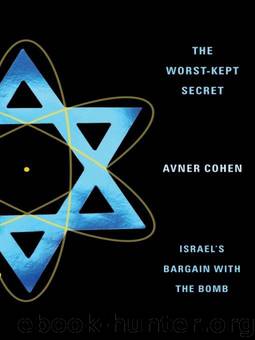The Worst-Kept Secret: Israel's Bargain with the Bomb by Avner Cohen

Author:Avner Cohen
Language: eng
Format: epub
Publisher: Columbia University Press
Published: 2010-05-31T18:30:00+00:00
Jurisdictional Confusion
In the summer of 1954, in response to internal disputes within the IAEC, Prime Minister Moshe Sharet wrote to his predecessor, former Prime Minister David Ben-Gurion, asking him to clarify under which ministerial jurisdiction he had established the IAEC two years earlier. At that time, Ben-Gurion had been serving as both prime minister and minister of defense: Had he set up the IAEC in his capacity as minister of defense or as prime minister? Ten days later Ben-Gurion responded, admitting that the IAEC’s statuary status lacked jurisdictional clarity, and he noted, “It is difficult for me to answer your question because at the time I did not ask myself if I was acting in my capacity as prime minister or minister of defense. It makes more sense to me now that I did it on behalf of the prime minister’s office.”2
When he made his decision, Ben-Gurion had no practical reason to be concerned about the capacity in which he was acting because combining the two portfolios was a way to solidify his national authority and power while deliberately blurring the boundaries between the two. This allowed him to control all aspects of national security. Only when he retired in December 1953 (this was his first retirement; he came back to power in January 1955 and then retired permanently in 1963) and only after the two positions were separated did Ben-Gurion decide that the two civilian intelligence agencies, known today as the Mossad and the Shabak (General Security Service, GSS), should be formally under the prime minister’s office, not the Ministry of Defense.3 Apparently, though, no such explicit decision was made for the newly established IAEC.
Sharet, who served only in the capacity of prime minister, had a practical need to determine which ministry had jurisdiction over Israel’s nuclear affairs. The confusion about the IAEC’s status was a matter of both politics and security considerations, which had stemmed largely from a deliberate effort to obscure the bureaucratic linkage between the Ministry of Defense and nuclear energy. For this reason (as I explained in chapter 4), the IAEC had two roles, one classified and the other unclassified. As a classified executive agency, the IAEC resided within, and was funded by, the Ministry of Defense (MOD), but as an unclassified advisory commission, it was under control of the prime minister’s office. Given Ben-Gurion’s dual portfolio, his powerful authority, and his fondness for “constructive ambiguity,” the question of formal jurisdiction meant little.4 Not only was this arrangement supportive of Israel’s security needs, but in those early days there was little interest in the formalities of due process.
In 1955 Ben-Gurion returned to power and to his two old jobs. A few years later, when the Dimona project started in earnest, it was subordinated bureaucratically to the MOD (but outside the IAEC’s bureaucracy). The reasons were primarily issues of personnel: Peres wanted an executive czar to build Dimona, Manes Pratt, and it was evident that the IAEC chairman, Bergmann, lacked the skills to be in charge of the project.
Download
This site does not store any files on its server. We only index and link to content provided by other sites. Please contact the content providers to delete copyright contents if any and email us, we'll remove relevant links or contents immediately.
| Arms Control | Diplomacy |
| Security | Trades & Tariffs |
| Treaties | African |
| Asian | Australian & Oceanian |
| Canadian | Caribbean & Latin American |
| European | Middle Eastern |
| Russian & Former Soviet Union |
The Secret History by Donna Tartt(19035)
The Social Justice Warrior Handbook by Lisa De Pasquale(12183)
Thirteen Reasons Why by Jay Asher(8885)
This Is How You Lose Her by Junot Diaz(6873)
Weapons of Math Destruction by Cathy O'Neil(6261)
Zero to One by Peter Thiel(5784)
Beartown by Fredrik Backman(5734)
The Myth of the Strong Leader by Archie Brown(5495)
The Fire Next Time by James Baldwin(5428)
How Democracies Die by Steven Levitsky & Daniel Ziblatt(5211)
Promise Me, Dad by Joe Biden(5141)
Stone's Rules by Roger Stone(5080)
A Higher Loyalty: Truth, Lies, and Leadership by James Comey(4947)
100 Deadly Skills by Clint Emerson(4917)
Rise and Kill First by Ronen Bergman(4776)
Secrecy World by Jake Bernstein(4739)
The David Icke Guide to the Global Conspiracy (and how to end it) by David Icke(4697)
The Farm by Tom Rob Smith(4501)
The Doomsday Machine by Daniel Ellsberg(4482)
